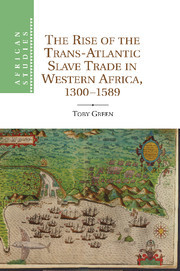Description
The Rise of the Trans-Atlantic Slave Trade in Western Africa, 1300–1589
African Studies Series
Author: Green Toby
Toby Green describes the rise of the trans-Atlantic slave trade in the aftermath of the Spanish conquest.
Language: English
Subject for The Rise of the Trans-Atlantic Slave Trade in Western...:
Approximative price 34.17 €
In Print (Delivery period: 14 days).
Add to cart
The Rise of the Trans-Atlantic Slave Trade in Western Africa, 1300-1589
Publication date: 03-2014
Support: Print on demand
Publication date: 03-2014
Support: Print on demand
Approximative price 111.60 €
In Print (Delivery period: 14 days).
Add to cart
The rise of the trans-atlantic slave trade in western africa, 1300â1589
Publication date: 10-2011
366 p. · 15.2x22.9 cm · Hardback
Publication date: 10-2011
366 p. · 15.2x22.9 cm · Hardback
Description
/li>Contents
/li>Biography
/li>
The region between the river Senegal and Sierra Leone saw the first trans-Atlantic slave trade in the sixteenth century. Drawing on many new sources, Toby Green challenges current quantitative approaches to the history of the slave trade. New data on slave origins can show how and why Western African societies responded to Atlantic pressures. Green argues that answering these questions requires a cultural framework and uses the idea of creolization - the formation of mixed cultural communities in the era of plantation societies - to argue that preceding social patterns in both Africa and Europe were crucial. Major impacts of the sixteenth-century slave trade included political fragmentation, changes in identity and the re-organization of ritual and social patterns. The book shows which peoples were enslaved, why they were vulnerable and the consequences in Africa and beyond.
Part I. The Development of an Atlantic Creole Culture in Western Africa, c.1300–1500: 1. Culture, trade, and diaspora in pre-Atlantic West Africa; 2. The formation of early Atlantic societies in Senegambia and Upper Guinea; 3. The settlement of Cabo Verde and early signs of Creolization in Western Africa; 4. The new Christian diaspora in Cabo Verde and the rise of a Creole culture in Western Africa; 5. The new Christian/Kassanké alliance and the consolidation of Creolization; Part II. Creolization and Slavery: Western Africa and the Pan-Atlantic, c.1492–1589: 6. The early trans-Atlantic slave trade from Western Africa; 7. Trading ideas and trading people: the boom in the contraband trade from Western Africa, c.1550–80; 8. Cycles of war and trade in the African Atlantic, c.1550–80; 9. Creole societies and the pan-Atlantic in late sixteenth-century Western Africa and America; Part III. Conclusion: 10. Lineages, societies, and the slave trade in Western Africa to 1589.
Toby Green is currently a Leverhulme Early Career Fellow at King's College London. He has published several books, the most recent of which is Inquisition: The Reign of Fear (2009). His books have been translated into ten languages. He is a director of the Amilcar Cabral Institute for Economic and Political Research. His articles have appeared in History in Africa, the Journal of Atlantic Studies, Journal of Mande Studies and Slavery and Abolition. Green has also written widely for the British press, including book reviews for the Independent and features for Financial Times, the Observer and the Times. He has given lectures at various institutes, including the Universities of Cambridge, Lisbon, Oxford and Paris-Sorbonne; Duke University and the School of Oriental and African Studies in London.
© 2024 LAVOISIER S.A.S.




